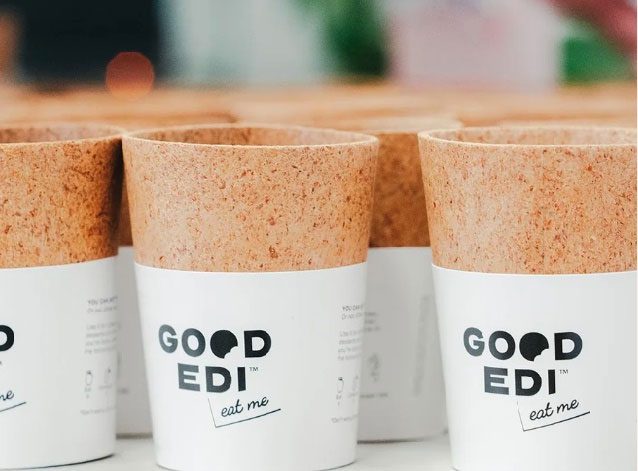According to our correspondent in Sydney, Australian startup Good-Edi has recently launched an innovative beverage cup made from edible materials, aimed at replacing widely used PE-coated paper cups in coffee shops.
This new product is biodegradable and is expected to help reduce waste management processes, such as landfilling or incineration, associated with disposable cups.

Edible cup produced by Good-Edi. (Photo: edi.com).
Good-Edi raised AUD 148,000 (approximately USD 96,108) through a crowdfunding platform in 2021. Their team, known as the “baking team”, is currently producing 500 cups a day for customers across Australia, including coffee shops, beverage stores, and concert venues in the suburbs of Melbourne. The company aims to increase production and expand its business into international markets in 2023.
According to Good-Edi, their product is suitable for both hot and cold beverages, such as coffee and tea. After approximately 250 formula adjustments, the founders of Good-Edi decided to use a mix of black barley flour, wheat bran, oat bran, sugar, salt, coconut oil, and water. They believe the cup is sturdy enough to hold a hot cup of coffee for about 40 minutes and will not leak cold beverages for up to 8 hours.
However, some who have tried Good-Edi’s cups have noted that they taste similar to sugar-free wheat cookies. This raises the question: Would coffee drinkers want to eat a cup if they do not consider it a food item?
Ms. Catherine Hutchins, co-founder of Good-Edi, believes this depends on individual taste preferences. She explains that Good-Edi does not make these products sweet to avoid impacting the flavor of the coffee. Good-Edi also plans to offer chocolate-coated cups and aims to release more options with various flavors soon.
According to Good-Edi, the main goal of the company is to ensure sustainability by creating more environmentally friendly products compared to plastic-coated paper cups, even if their customers do not eat the new cups. The company’s products can decompose within 2 to 6 weeks. Using locally sourced materials, the production of each cup generates only 80 grams of CO2 over its lifecycle, which is 27% less than the 110 grams of CO2 produced in the manufacturing of an imported paper cup.
Good-Edi is not the only startup producing edible cups. A startup in Latvia is also offering various flavored edible cups, along with spoons made from oat fibers, cocoa shells, and straws made from pasta. Meanwhile, Bulgarian-based company Cupffee has been mass-producing edible cups for coffee or tea since 2018.
According to Mr. Ismail Sutaria, an expert at the market consulting firm Future Market Insights, the use of paper cups with plastic liners for hot beverages is expected to increase by more than 9% over the next three years. By 2025, consumption is projected to reach 166 billion cups per year. Mr. Sutaria believes that practicality, scalability, cost-effectiveness, and consumer acceptance are crucial factors in assessing this as a sustainable solution.
The United Nations Environment Programme (UNEP) estimates that the world uses over 250 billion plastic-coated paper cups each year, with only 1% of them being recycled. In Australia alone, approximately 2.7 million disposable cups are sent to landfills every day.



















































